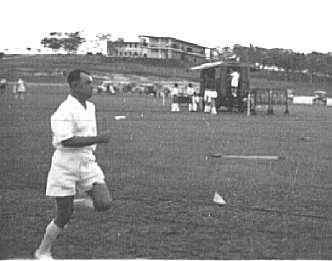Commanding Officer of 84 Squadron RAF

Squadron Leader G.C. Unwin. D.F.M. was C.O. of 84 Squadron during the period 16th September 1949-August 1951. (He broke his leg playing football for the Sqdn. team and was ferried back to U.K.).

Way back in 1950, it was not the done thing to enquire about the life of your C.O.. He was your 'Master' and anyway if you did ask, most of your comrades would not know. I found him to be a really outstanding Pilot, great leader, very fair with his 'boys' and would never ask anyone to do anything he could not do himself. Back then that was as much as you knew of him. The following is what he told me about his life 50 years later at our Squadron re-unions.
He was born in January 1913 a true Yorkshireman and son of a miner, he was determined from an early age never to become a coal miner and went to the local Grammar School. He was a very good footballer.
He answered an advertisement offering apprenticeships in the R.A.F. and joined as a boy clerk at the age of 16 (1929). He trained at the former apprentice school at Ruislip, serving at Uxbridge for four years where he was selected for Pilot training in 1935. In 1936 as a qualified pilot he joined No: 19 Sqdn flying a bi-plane Gauntlet fighter By August 1938 George was with No: 19 Sqdn where they became the first to receive the Spitfire, by then he was a Sergeant and became probably the first N.C.O. to fly the Spitfire and often flew with Douglas Bader as his wingman. The Sqdn was heavily engaged during the Dunkirk evacuation in 1940 but on the very first sortie by 19 Sqdn was not allocated a Spitfire. He complained bitterly - as only a Yorkshireman can - and earned the nickname of 'Grumpy' Unwin which stayed with him for the rest of his service career. He was in action the next day. By the end of the Dunkirk evacuation he had shot down 5 enemy aircraft. 2-unconfirmed. On September 1940 he damaged 5 German fighters and two were confirmed as destroyed. On September 15th he shot down 3 more German BF 109's. Two days later he was awarded the D.F.M. (Distinguished Flying Medal). He continued to take a very active part in operations, shooting down three more German fighters and shared in the destruction of two others
On November 28th he had his final success whilst patrolling over a convoy. In early December he was awarded a bar to his D.F.M. One of only 60 Pilots to be twice awarded the D.F.M. during WW2 and was never injured. He served with the Squadron for 4 years becoming one of the few pilots to fly throughout the action at Dunkirk and the Battle of Britain. In December 1940 he was rested.
In the early days George would not apply for a commission since a Senior Flight Sergeant earned a few more shillings than a Junior Officer but later when the rules where changed he applied and was interviewed a number of times but his passion for football did not impress the selection boards. He told me that a colleague said that an interest in horses would impress the board and low and behold he was recommended for a commission. George didn't mention that his total experience with horses were the pit ponies in the coal mine where his father worked.
He was made a Pilot Officer in July 1941. He had a very varied and interesting career and in 1948 was given command of 84 Sqdn. Initially based in Iraq. He was awarded the D.S.O. for his service in Malaya and retired from the R.A.F in 1961 with the rank of Wing Commander. He married Edna, (who was always called 'Jimmie') Cornwell in 1939. Sadly she died in 2003 and George joined the "Squadrons in the Sky" in 2006.

